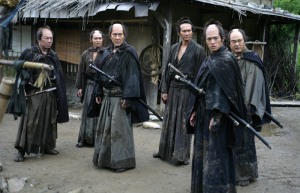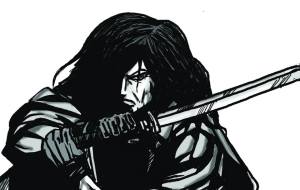Victory through Honour
In a society where death can come quickly and unexpectedly a man’s immortality relies upon his reputation. In mystical Nippon this is seen in the honour that he is held in by his comrades. This is called ‘On’. So to most men honour is everything. They will fight to gain honour, commit acts that in other societies may be seen as brutal for it and, most importantly they will die to preserve it.
In Daishō this is covered in the section on ‘Victory through Honour’. Unlike IHMN, each scenario is set up with objectives that will earn the Buntai On. Achieving these objectives is the primary driver of the game. However, there are also actions that figures may be able to take in any game that will earn them extra On.
For example defeating your opponents will earn you On equivalent to their social caste. So the more socially important figures are worth more, with Leaders worth bonus points as well. There are other actions that can earn On and these will be explained in detail in the rules.
Also if a figure is defeated and captured he can still attempt to save On through Seppuku. This is important as you lose On if your men are captured and thus disgraced.
[Illustration © Tony Yates]
A very important point is that failure to achieve a scenario’s objectives may not mean defeat. If a Buntai can achieve enough On through honourable actions they may still win, even if their opponents technically succeeded at the scenario objectives.
We feel that this is another mechanic that will encourage players to get the feel of mystical Nippon and produce some entertaining and heroic results.



This is what’s lacking in other Samurai based games, they may look the part but they don’t have the feel for the period.
Well these rules will include Ki, On, Karma and many other essential elements.
For example IHMN had its required in-game courtesies, so will Daishō. There are instructions on precisely how to bow to your opponent before and after the game.
If my old knees would take it I would recommend hacking your games table legs off and playing at tatami level :), but I am a traditionalist.
Banzai!
That sounds very unlike all other games I play, this is why I like it. The need to preserve your honour and do honourable things during a game both as a player and with your model avatar makes me want to play this mechanic now. Are you also proposing to display the other side of the coin, dishonour or dishonourable conduct, as this could be both a bad and a good thing to a character dependant on what path they follow.
We always get uneasy when writing rules that punish players for what we perceive to be ‘wrong’ actions.
We prefer to reward actions that reflect the game’s narrative or theme and allow the lack of reward for actions that don’t to be ‘punishment’ enough.
I remember playing a skirmish board game called Samurai (along with cry havoc and siege etc) in which you could still ‘win’ by composing a poem and committing hari kari.
That is going back quite a way. To the early 80’s if my memory serves me well.
Sorry I’m late to the game. This sounds like a neat idea but with honor playing such an integral part of the game, how do you plan to work On for non-honor bound factions like bandits, demons, undead, etc..?
Hi Nikdo,
In this game On will be a constant across all factions, though each faction’s precise interpretation of On may be slightly different. Honour is how others of your clan or kind see your actions.
Cheers,
Craig
Thanks, Craig. That sounds very playable. It represents honor for some and something else (like notoriety) for others. I’m looking forward to see how things progress.